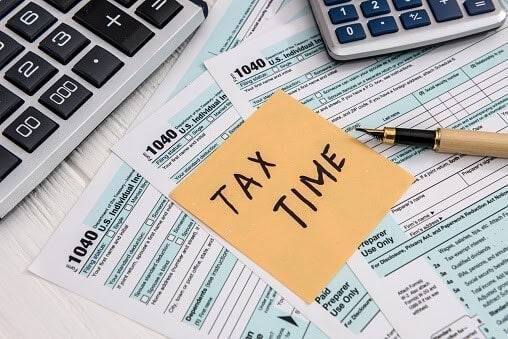Welcome to the world of freelancing, it’s a journey that you do on your own and may feel isolating, but it can be rewarding. We’re here to help guide you through the nuances of paying taxes as a freelancer.
Freelancing has a lot of conditions that you’ve never experienced before in the corporate world – one of the biggest ones being taxes.
In the past, you got a W9, and that was that. Now… it’s not so easy. In this guide, I’ll tell you everything you need to know about paying taxes as a freelancer. I should know – I’ve been freelancing long enough to know the ins and outs of taxes.
At the end of this piece, you should feel comfortable filing your taxes as a freelancer, and you should have answers to all of your questions.
Note: Keep in mind I’m not a tax adviser. I’m just a freelancer making suggestions. Talk to a tax professional if you want legitimate advice for your specific situation.
If you’re asking, “do I have to pay taxes on freelance work” you’re in for a surprise – yes, you have to pay taxes on freelance work. You’ll wind up paying more in taxes than you would from an office job.
I’ll get more into detail in a second.
I won’t talk about this too much, but it’s important to understand that you can eat up some of your tax responsibility with deductions. Please refer to a tax specialist from a company like Taxslayer to help you.
The general idea is that work-related travel, your home office, education, and equipment can be write-offs for your taxes.
See Related: Fiverr vs Freelancer
Just like any other company, it’s all about money in and money out. By keeping a detailed log of these expenses during the year, filing your taxes becomes that much easier.
Many freelancers decide to perform quarterly reports. This means that four times a year, you pay your income tax, so there isn’t a big tax at the end of the year. If you haven’t been keeping up with quarterly reports, you might be paying an additional (small) fee to the IRS. As a freelancer, always know your worth when bidding on your rate. With all these deductions, make sure that you are well compensated.
During tax season, you’ll file your taxes along with a form called Schedule C. It outlines your income and your expenses to calculate your net income.
See Related: Project Management Apps for Freelancers
If you’re a freelancer, your next question is probably, “how do freelancers pay taxes?” There’s no need to worry; it’s not as hard as you think. You have two options here – either file on your own or bring in a tax pro.
If you’re filing on your own, I would highly suggest HR Block. It is an easy-to-use software that guides you step-by-step through the process. They also have support and professionals that can help you through the process.

The actual process of paying taxes is easy to understand. In corporate America, your paycheck has a bunch of deductions in it. Among these deductions are federal and state taxes.
Behind the scenes, your employer is also paying a chunk of the taxes in the form of an employment tax.
People who work for a company and have a W9 will see these deductions on their payslips, but it might not mean so much to them. As a freelancer, it’s a little different.
You’re taking home all of the money that a client pays you, and there aren’t any taxes taken out. That doesn’t mean you’re tax-exempt, though – it just means that Uncle Sam is waiting until later to collect the taxes owed.
The difference is that when you deposit (or spend) the check you get from a client, you’re also depositing or spending the taxes you owe.
See Related: How to Register as a Freelancer
Do freelancers pay taxes on everything or just a part of their earnings? This question is a big one that comes around when calculating how much you owe to the government.
My tip to most freelancers is to find out how much you profited and set aside 30% of that. As a reminder, your profit is how much you made minus how much you spent on freelancing work.
Some suggest setting aside 25%, but I always think it’s better to be safe. I’d rather have too much money set aside than not enough.
See Related: Best Time Tracking Apps for Freelancers
As a freelancer, you might think every penny you take home goes to you. The truth is that much of it goes to taxes—the experts at Tax Act.
When you work an office job, your employer will pay a portion of your taxes. As a freelancer, you’re on the hook for the full 15.3% of income tax. Not only are you an employee, but you’re also considered the employer!

There isn’t a ton of paperwork that you need to file taxes on your own. As long as you know your net profit or know how to find it, you’re usually in a good place.
Even if you don’t get tax forms from your clients, you can still figure out everything on your own. Pick a tax software of your choice and get to work – for the most part, they tell you step-by-step instructions. They don’t want you to run into any legal problems.
Make sure you have all of your information handy before getting started. This includes your ID and Social Security Card. Filling out the forms completely is the only way to avoid the IRS tracking you down.
If you made more than $400 in the year, then you have to pay taxes. There’s no way out of it as a freelancer.
Also, it is an obligation to pay taxes and for us to be able to manage it, using tax software is an option.
See Related: Best Apps for Freelancers
In case you’re lost, let me boil it down to four simple steps. As long as you follow these steps, it would be best if you were on your way to paying your taxes.
Think back to when you filed your taxes when you were a full-time worker in an office. Knowing your income was the first step of the process, and it’s the first step here, too. You can use a free hourly rate calculator to help you a ton.
It’s a little harder as a freelancer because you don’t get a single sheet of paper that tells you everything you need to know for filing taxes. In this case, it’s a matter of doing some digging.
The easiest thing to do is review the invoices you sent clients. This is going to be all the money that you made.
If you didn’t send invoices to clients, then check the accounts that the money went through. If you get paid through PayPal or your bank, you can check the apps or websites to see your income information.
With this information, you’re ready to go to the next step.
Pro tip: Keep an excel spreadsheet or use a program like Quicken Self-Employment to make this step easier in the future!
See Related: Best Freelance Skills to Learn

After knowing your income, it’s time to know your deductibles. This was briefly described earlier. This is the money that you can claim as business expenses for the year. Consulting with a tax pro will help you understand what you can and can’t write off as business expenses.
Online courses to further your education in freelancing are an example of a deductible. This is also the area where a lot of people get in trouble. The most common area the IRS checks for tax fraud is the deductibles associated with a home office. Make sure you’re being honest as you fill this section out.
For future reference, you should keep receipts of your deductibles in one place for easy access. As a freelancer, always know your worth when bidding your rate and make sure that you are well compensated.
With your deductibles worked out, let’s move to the next step.
See Related: Upwork Alternatives for Freelancing
Your income goes into the “money made” section, and your deductibles go into the “money spent” section. As you step through tax software like Liberty Tax, it will ask you other questions that you’ll know the answers to.
The bottom line is that you need a good understanding of your income and deductibles before starting your taxes. Otherwise, you’ll have to take a bunch of breaks in the middle of filing to do quick math and hunt down paperwork and figures.
You can take your information from steps 1 and 2 and either file on your own or with a tax pro.
After filing, you should immediately open a business account for your freelancing gig. Why? It makes taxes significantly easier in the future. Use your business account for any money you make or spend on your business. The total at the end of each quarter will be your net earnings.
It also keeps all of the transactions in one place. You can easily go back through summaries and fill out your taxes quicker next time.
This is perhaps the best advice I can give anyone who is a freelancer and getting ready to file their taxes. Making a separate business account saved me so much time and countless headaches!
See Related: Toptal vs Upwork
I know that was a lot of general information I just told you. Your natural reaction is probably to ask how you pay taxes on freelance work in your specific case. Well, let me answer some of your questions in this FAQ section.
It shouldn’t be too hard to dig through your files and find your net profit. Remember, your net profit is the money you make minus the money you spend. This is only for freelancing work.
I suggest going through your banking files and your PayPal account (if you get paid on PayPal). Tally up the money that you made and the money you spent. There should be a good paper trail online, thanks to these apps.
There’s no law requiring you to open a business bank account. I always suggest it because it makes things much easier (it was step 3 in the process above).
I open a business bank account, and anything related to freelancing goes through that account. At the end of the day, that is my net profit. Every transaction, in or out, can be used in my taxes each quarter.
Freelancers typically pay taxes quarterly. Quarterly means four times a year or every three months. The official date for filing taxes is the same as everyone else – April 15.
If you file with Intuit, you can file up to 3 months early. The quarterly due dates are also June, September, and January 15th.
If you are underpaid, that’s a problem. You’ll owe the remaining balance come tax day. Additionally, they’ll charge you a little late fee.
Overpaying is good news. You’ll get your money refunded the following tax year. It’s always better to overpay than underpay.
First off, take a deep breath and relax. The IRS has been taking taxes for longer than we have been alive, so they’ve seen people in your situation before.
The bottom line is that you still owe this money, but the IRS might help you a little.
You can put together an installment plan with the IRS (that might include additional interest charges). You can also file for a short-term extension that pushes your due date back to August. Even if you can’t afford the taxes, you legally still need to file by April 15 or else you’ll owe even more.
A 1099 form is the freelancer’s version of a W9 form. It tells the IRS how much you made and, subsequently, how much you owe.
This form answers the question, “how do you pay taxes on freelance work?” Even if a client doesn’t send you a 1099, you legally have to file every penny you made during the year as a freelancer.
Let me make this very clear – failure to claim money you made as a freelancer is super illegal, and the IRS will figure it out. They can see the money that goes into your account, and if it isn’t all accounted for, an audit will set you back even more than you owe.
Please be careful here. You can’t outsmart the IRS by purposefully omitting some money you made.
If they find out, you’ll owe even more. This isn’t a gamble that’s worth it in the end.
Anyone who makes money Freelancing (above a certain amount) in this country has to contribute. That’s just the way the laws are set up. There’s no way to wiggle your way out of this one; you’ll have to do it.
Related Articles
Last updated: November 9, 2022